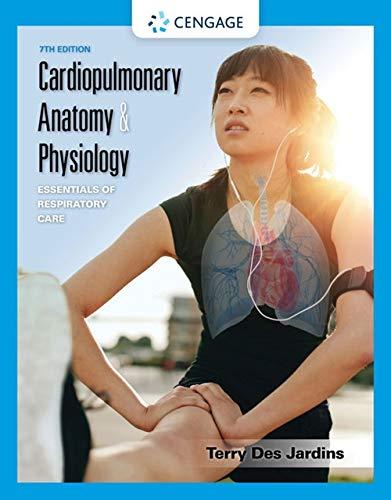
Introduction:
Aging is an irreversible process that occurs despite optimal nutrition, genetic background, surroundings, or activity patterns. The bodily functions decrease as a person ages and the organ functions are also affected. Lungs are also affected likewise, as it reaches the final growth stage at the age of 20 years and after 25 years of age the quality of the lungs gradually decreases.
Answer to Problem 1RQ
Correct answer:
As an individual ages, the vital capacity decreases.
Explanation of Solution
Justification for the correct answer:
Option (D) states that as an individual ages, the vital capacity (VC) decreases. This is a true statement as VC is the maximum amount of air that a person can expel from their lungs after inhalation. VC is equal to the total lung capacity (TLC) minus the reserve volume (RV). Hence with age, the reserve volume increases, which leads to a decrease in VC with increasing age. Hence, option (D) is correct.
Justification for the incorrect answers:
Option (A) states that as an individual ages, the residual volume decreases. This is false, as with age, the alveoli enlarge and the airway starts to close. Hence, the residual capacity generally increases with age. So, it is an incorrect option.
Option (B) states that as an individual ages, the expiratory reserve volume increases. This is not true, as with an increase in residual volume (RV), the expiratory reserve volume (ERV) decreases due to reduction in chest wall compliance and the increase in air trapping. So, it is an incorrect option.
Option (C) states that as an individual ages, the functional residual capacity decreases. This is a wrong statement because it is the volume that remains in the lungs after the elastic recoil balances the expansion of chest wall. With age, this elastic recoil decreases and is not able to balance the chest wall expansion. Therefore, the functional residual capacity increases as a person ages. So, it is an incorrect option.
Hence, options (A), (B), and (C) are incorrect.
Thus, it can be concluded that as an individual ages, the vital capacity (VC) decreases due to the increase in reserve volume.
Want to see more full solutions like this?
Chapter 11 Solutions
Cardiopulmonary Anatomy & Physiology
- 22. Which of the following mutant proteins is expected to have a dominant negative effect when over- expressed in normal cells? a. mutant PI3-kinase that lacks the SH2 domain but retains the kinase function b. mutant Grb2 protein that cannot bind to RTK c. mutant RTK that lacks the extracellular domain d. mutant PDK that has the PH domain but lost the kinase function e. all of the abovearrow_forwardWhat is the label ?arrow_forwardCan you described the image? Can you explain the question as well their answer and how to get to an answer to an problem like this?arrow_forward
- Describe the principle of homeostasis.arrow_forwardExplain how the hormones of the glands listed below travel around the body to target organs and tissues : Pituitary gland Hypothalamus Thyroid Parathyroid Adrenal Pineal Pancreas(islets of langerhans) Gonads (testes and ovaries) Placentaarrow_forwardWhat are the functions of the hormones produced in the glands listed below: Pituitary gland Hypothalamus Thyroid Parathyroid Adrenal Pineal Pancreas(islets of langerhans) Gonads (testes and ovaries) Placentaarrow_forward
- Describe the hormones produced in the glands listed below: Pituitary gland Hypothalamus Thyroid Parathyroid Adrenal Pineal Pancreas(islets of langerhans) Gonads (testes and ovaries) Placentaarrow_forwardPlease help me calculate drug dosage from the following information: Patient weight: 35 pounds, so 15.9 kilograms (got this by dividing 35 pounds by 2.2 kilograms) Drug dose: 0.05mg/kg Drug concentration: 2mg/mLarrow_forwardA 25-year-old woman presents to the emergency department with a 2-day history of fever, chills, severe headache, and confusion. She recently returned from a trip to sub-Saharan Africa, where she did not take malaria prophylaxis. On examination, she is febrile (39.8°C/103.6°F) and hypotensive. Laboratory studies reveal hemoglobin of 8.0 g/dL, platelet count of 50,000/μL, and evidence of hemoglobinuria. A peripheral blood smear shows ring forms and banana-shaped gametocytes. Which of the following Plasmodium species is most likely responsible for her severe symptoms? A. Plasmodium vivax B. Plasmodium ovale C. Plasmodium malariae D. Plasmodium falciparumarrow_forward
 Cardiopulmonary Anatomy & PhysiologyBiologyISBN:9781337794909Author:Des Jardins, Terry.Publisher:Cengage Learning,Basic Clinical Lab Competencies for Respiratory C...NursingISBN:9781285244662Author:WhitePublisher:Cengage
Cardiopulmonary Anatomy & PhysiologyBiologyISBN:9781337794909Author:Des Jardins, Terry.Publisher:Cengage Learning,Basic Clinical Lab Competencies for Respiratory C...NursingISBN:9781285244662Author:WhitePublisher:Cengage Human Physiology: From Cells to Systems (MindTap ...BiologyISBN:9781285866932Author:Lauralee SherwoodPublisher:Cengage Learning
Human Physiology: From Cells to Systems (MindTap ...BiologyISBN:9781285866932Author:Lauralee SherwoodPublisher:Cengage Learning





